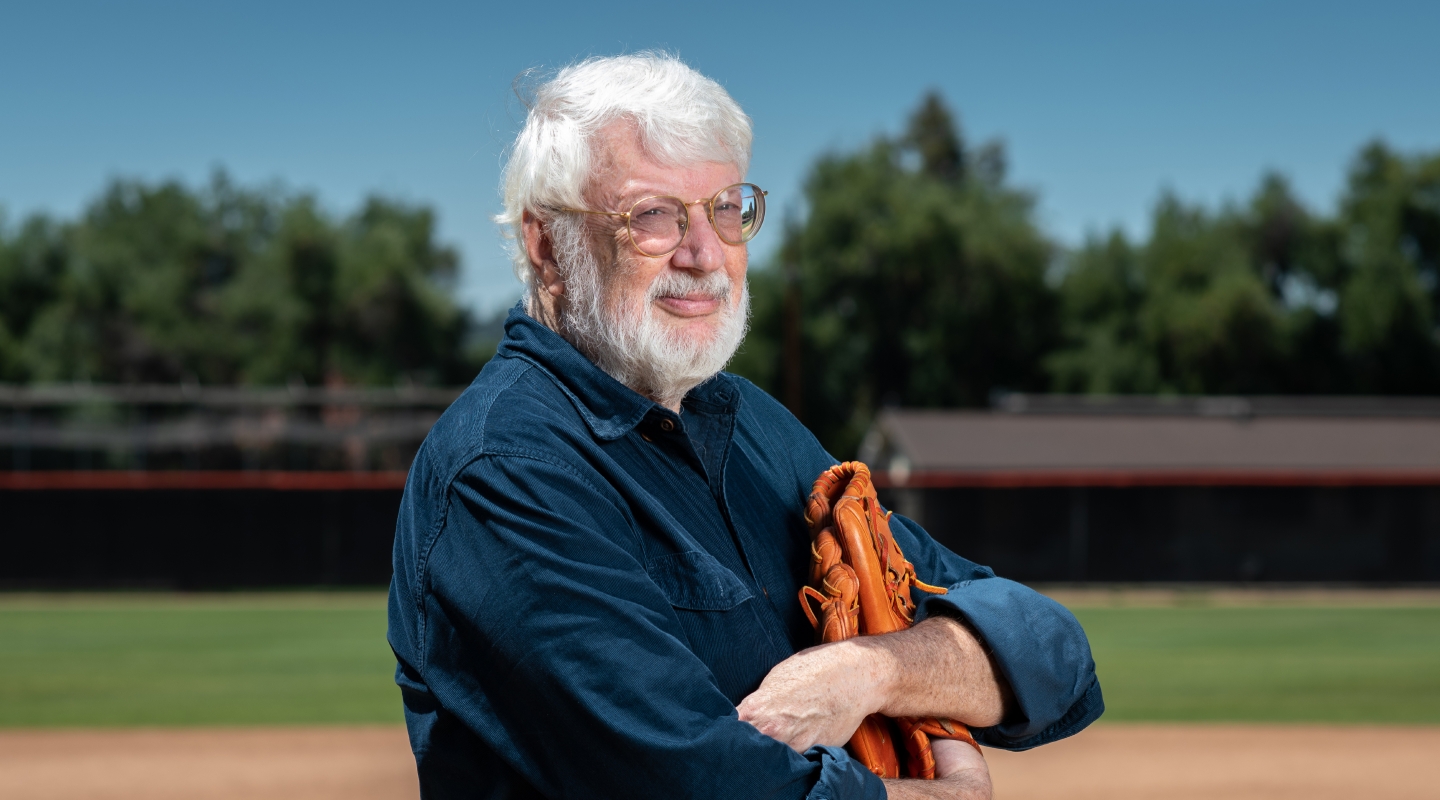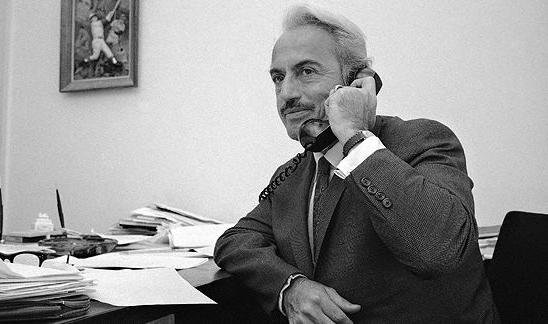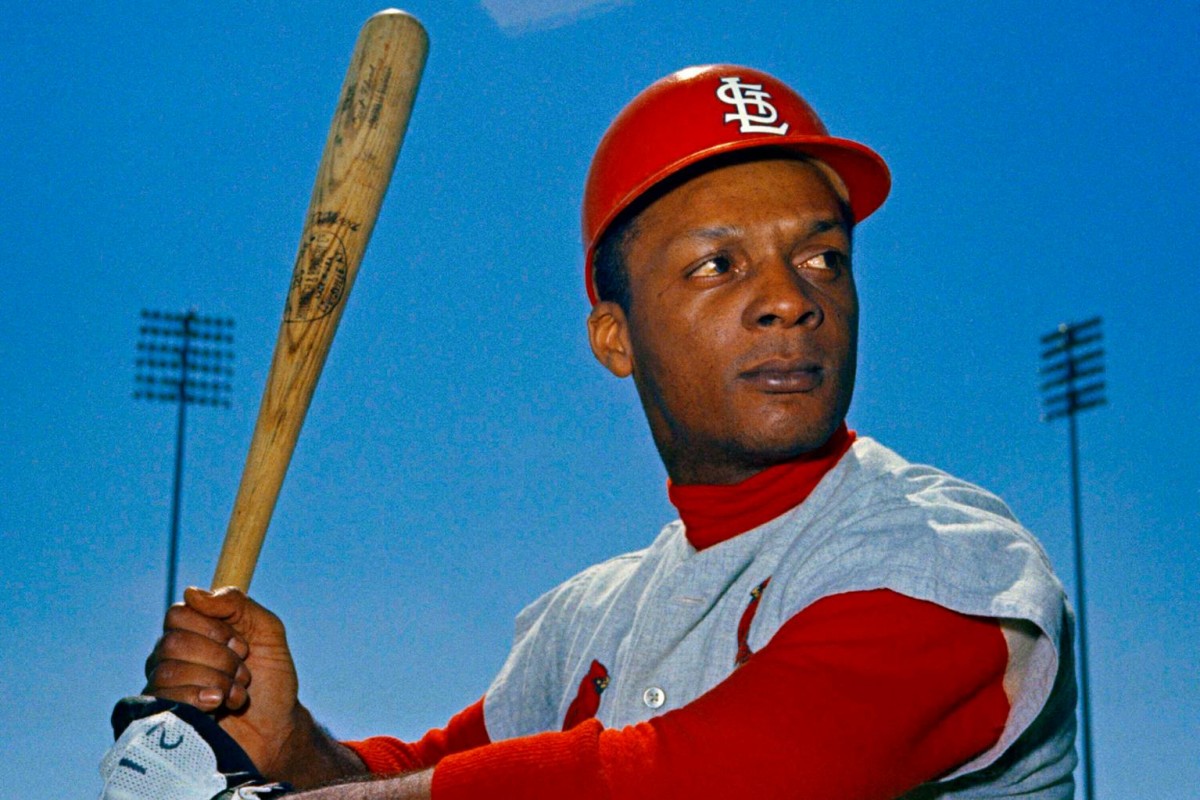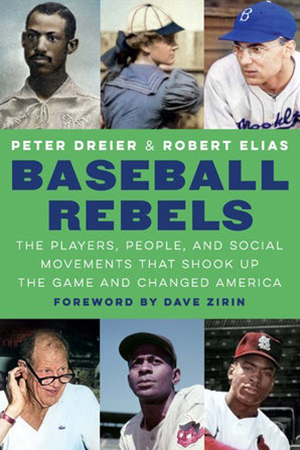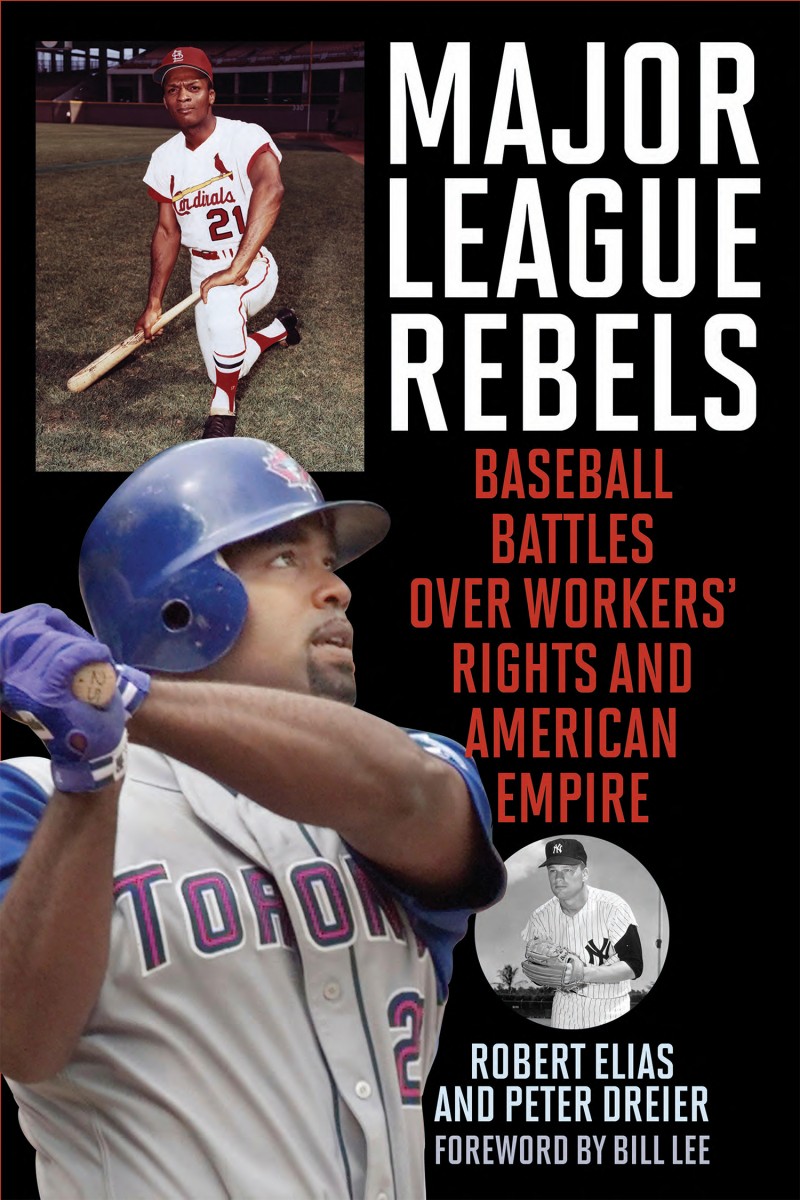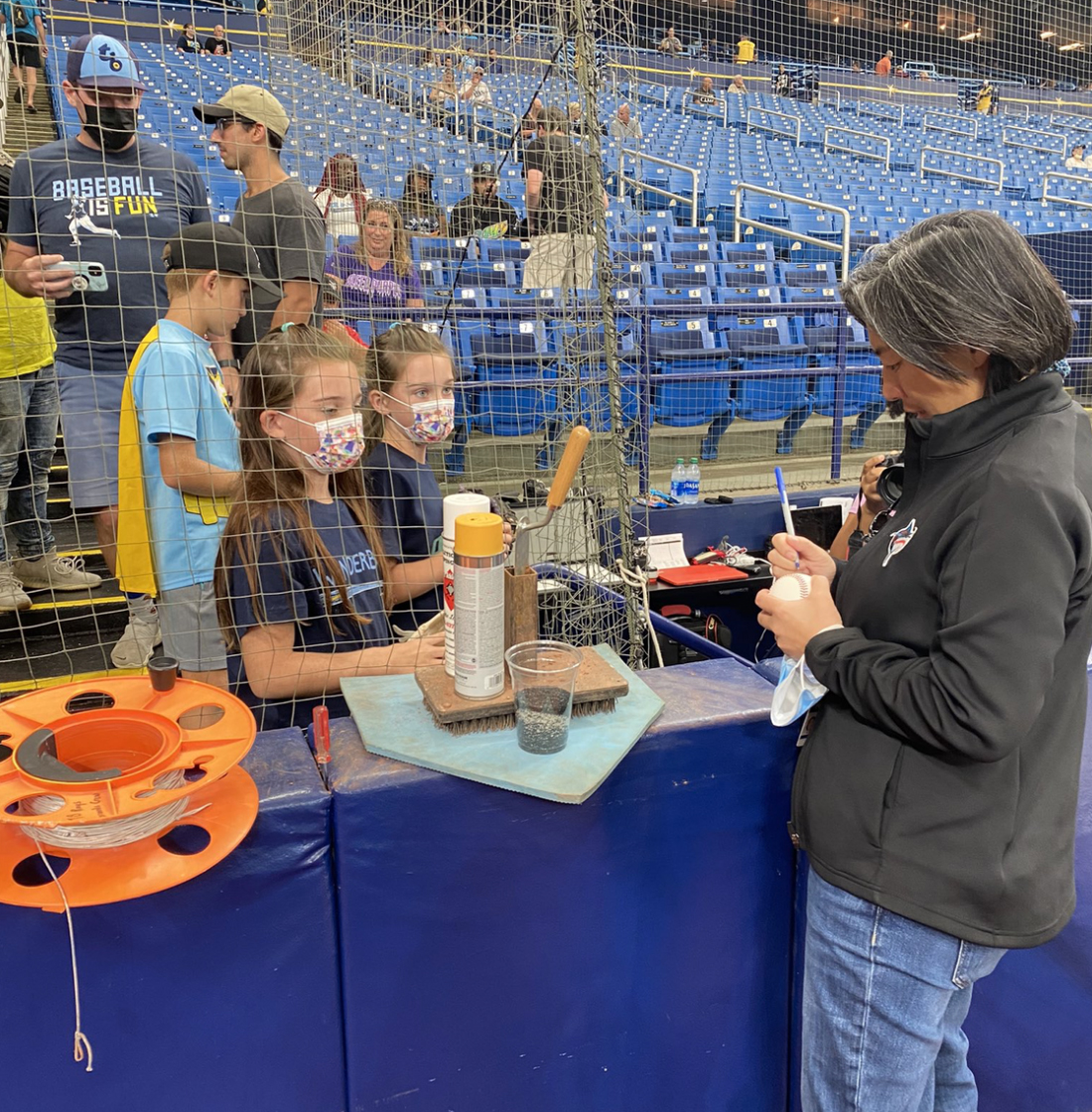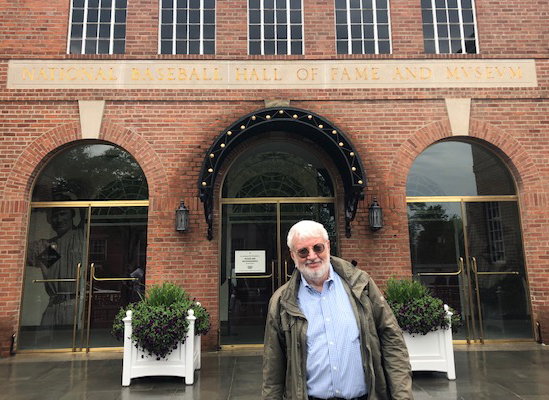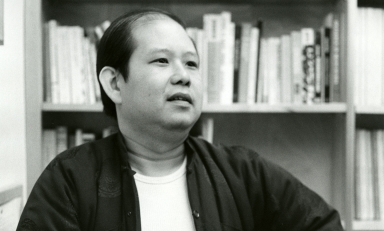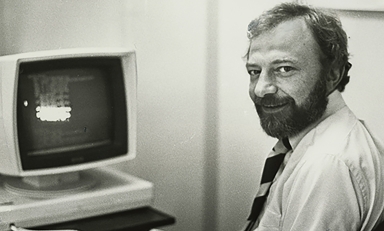In a pair of new books, Oxy politics professor Peter Dreier tips his cap to the mavericks, iconoclasts, and rebels who have shaped baseball history
Peter Dreier’s relationship with baseball began in New Jersey in the mid-1950s, when he rooted for Johnny Antonelli, Willie Mays, and the New York Giants. But when the Giants relocated to San Francisco in 1958, he had to find another team: “I still liked Mays and Antonelli, but I couldn’t transfer my allegiance to San Francisco.
“Like most American boys growing up in the ’50s and ’60s, I wanted to be a major-league player, but I wasn’t good enough to do that,” says Dreier, now the E.P. Clapp Distinguished Professor of Politics at Occidental. “I had to find another way to earn a living.”
Before joining the Oxy faculty in 1993, Dreier worked as a newspaper reporter, a community organizer, a professor at Tufts University, and a deputy to Boston Mayor Ray Flynn. It was at Tufts, in the 1970s and early ’80s, that he met Robert Elias, who is now a politics professor at the University of San Francisco. “We’re both baseball fans and fans of Howard Zinn’s book A People’s History of the United States (1980), which is about America’s unsung heroes and movements,” Dreier says.
In July 2017, Dreier and Elias wrote an article for Jacobin magazine titled “Out of Left Field,” detailing how baseball has intersected with the struggles for social justice since the late 1800s. Soon afterward, Dreier says, “We got some inquiries from publishers about turning this into a book. We’d already been talking about doing that, but having a contract stirs your imagination.” They signed with the University of Nebraska Press (UNP) for a book of about 350 pages and started doing the research, dividing up the first draft by chapters.
“We dug up incredible stories that people hadn’t written about—great nuggets in archives and interviews and other things that we learned,” Dreier says. The resulting manuscript wound up being twice as long as they had originally contracted for. UNP balked at the cost of publishing a much longer book, or two separate volumes—but with its blessing, Dreier and Elias engaged Rowman & Littlefield to publish a second book.
And that’s how Dreier (himself the parent of twin daughters, 25-year-old Amelia and Sarah, with his wife, Terry Meng, a nurse practitioner) welcomed two books into the world on the same day in March: Baseball Rebels: The Players, People, and Social Movements That Shook Up the Game and Changed America (UNP) and Major League Rebels: Baseball Battles Over Workers’ Rights and American Empire (Rowman & Littlefield).
“Both books are about baseball’s mavericks, dissenters, and iconoclasts,” Dreier says. “The topics and the people are different, but they share a common spirit.” Baseball Rebels is about struggles against racism, sexism, and homophobia. Major League Rebels is about workers’ rights and unions, the exploitation of players from Latin America, and battles to challenge baseball’s ties to American militarism."
Dreier did about 30 interviews for the books, including one with the widow of Curt Flood, whose playing career ended at age 32 in 1970 after he sued MLB to end the reserve clause, which Dreier calls baseball’s version of “indentured servitude"; Billy Bean, who came out as gay in 1999 (MLB’s second player to do so, four years after retiring from the game); and Hall of Fame pitcher Dennis Eckersley, who even wrote a blurb for the books.
Of all the stories he heard, the most surprising was that of Sam Nahem, a Jewish socialist pitcher for the Dodgers, Cardinals, and Phillies in the 1930s and 1940s. “He had some success in the majors but his most important accomplishment in baseball occurred during World War II,” Dreier says.
After the Germans surrendered in 1945, every U.S. military base in Europe organized a baseball team—but the teams, like the military in general, were racially segregated. Stationed in France, “Nahem challenged the status quo by recruiting two Negro League stars to play on his team, which won the military World Series. This helped pave the way for Jackie Robinson and the dismantling of Jim Crow in the major leagues.” (In 2020, MLB, officially correcting what it called “a longtime oversight in the game’s history,” announced it would include Negro League statistics and records as part of MLB history.)
Nahem’s major league career ended in 1948. Even though he had earned a law degree during the off seasons while playing pro ball, he didn’t practice law. He spent 25 years as a worker and union leader at a Chevron chemical plant in Richmond, Calif., before retiring in 1980.
“Hardly anyone knew his story,” Dreier says. “I interviewed his son and other family members. I read hundreds of newspaper stories about his baseball career, and then I dug into his political activities. He was surveilled by the FBI for over 10 years, and I persuaded his son to get me his dad’s files. My only regret is that Sam died in 2004, so I never got to interview him. He lived a fascinating life.”
Dreier wound up writing much more about Nahem than he had intended—too much for the pages of Baseball Rebels. So, he wrote a nearly 10,000-word bio on Nahem for SABR, the Society of American Baseball Research, which has set out to publish biographies of all 20,000 players that have played the major leagues, plus all of the managers and umpires and some sportswriters.
Going further back, Dreier tells the story of Frank “Doc” Sykes, who pitched in the Negro Leagues for 13 years, including in the league’s 1917 World Series, and played for the Lincoln Giants through 1919, a year after completing dental school at Howard University. While he was playing in the Negro Leagues, Sykes organized his teammates and the other players in the league to demand fixed salaries.
After he retired from baseball and moved back to his hometown of Decatur, Ala., Sykes emerged as a key witness in the retrial of the Scottsboro Boys—nine Black teenagers who were falsely accused of raping two white women on a train in Alabama in 1931. All nine spent time in prison before their conviction was overturned by the Supreme Court in November 1932. A new trial was ordered and moved to Decatur—a town 50 miles away from Scottsboro that, like many Southern towns, excluded Black people from the jury rolls.
Samuel Leibowitz, a prominent New York attorney who had taken on the case, called Sykes to testify. “Sykes revealed a list of 200 Black citizens in Decatur who were qualified to serve on a jury but hadn’t been called,” Dreier explains. “He took enormous risks to do that.” After the Ku Klux Klan burned a cross on his front lawn, Sykes moved his family to Baltimore, where he resumed his dental practice.
In Baseball Rebels, Dreier and Elias also tell the little-known story of a player-led protest that took place after Martin Luther King Jr. was killed on April 4, 1968. To honor King, most major sporting events, including NBA and NHL playoffs, were canceled. But Baseball Commissioner William Eckert, a former Army general, left it up to the owners of each team whether to cancel their games.On April 8, the Pirates were scheduled to play the Astros in Houston on Opening Day. Pirates players Maury Wills, Roberto Clemente, Donn Clendenon, and Dave Wickersham called a meeting of their teammates, saying that they shouldn’t play until the day after King’s funeral. Their teammates unanimously agreed, Dreier says, “and then they went over to the Houston team, and convinced them not to play either.” The protest quickly spread throughout baseball. The players on every team agreed not to play, challenging the wishes of their owners, who didn’t want to give up the revenue from the games.
“The newspapers at the time made it sound like the beneficent owners decided to cancel the games in Dr. King’s memory,” Dreier says, “but they were forced to do it by the players. It was a two-day strike for racial justice. I love that story.”
Major League Rebels explores the first union of pro athletes and the emergence of a player-owned league in the late 1800s; the rise of the MLB Players Association in the 1950s; the challenges to baseball owners’ efforts to challenge threats to its monopoly (such as the Mexican League, which recruited MLB players); players’ opposition to U.S. militarism, including the Vietnam War; and the struggles of players from Latin America to challenge their mistreatment by major league teams and to resist U.S. imperialism in the Dominican Republic, Venezuela, Nicaragua, and Cuba.
In a section of Baseball Rebels titled “Resisting Sexism and Homophobia,” Dreier and Elias trace the origin of women’s involvement in baseball back to the first women’s colleges in the 1860s. By the 1930s, however, softball had supplanted baseball in women’s sports. When the All-American Girls Professional Baseball League (made famous in the 1992 film A League of Their Own) was formed in 1943, most of the athletes were softball players. “They had to convert to baseball,” Dreier says.
The enactment of Title IX in 1972 opened the door for more girls and women to participate in organized sports. Today, more than 1,000 colleges—286 in Division I—field intercollegiate women’s fast-pitch softball teams. There are several professional women’s softball leagues. But women’s baseball also is experiencing a resurgence thanks in part to Justine Siegal, founder of Baseball For All, a nonprofit designed to provide opportunities for girls and women to play, coach, and lead in baseball. (Oxy itself fielded a women’s baseball team for the first time in 2022, competing in Baseball For All’s Inaugural Women’s College Club Baseball Championship tournament in March.)
“The same thing is not quite true of gay players, but there have been improvements on that front,” he adds. “Every major league team except the Texas Rangers has a Pride Night and teams now punish players, managers, and broadcasters who use homophobic slurs. The culture inside baseball is definitely changing.”
When Dreier interviewed Billy Bean—who was named MLB’s first Ambassador for Inclusion in 2014 and is currently vice president and special assistant to Commissioner Rob Manfred—“he told me that he doesn’t think any current gay players in the majors will come out. But he thinks that there will be a gay player in the majors in the near future—and that it would be better if multiple players came out at the same time.”
Tying it all together, Dreier sees “an enormous amount of progress.” He and Elias devote the last chapters of both books to “Baseball Justice: An Unfinished Agenda,” calling on MLB to be more inclusive and fair—such as allowing minor league players to unionize, improving the sweatshop-like conditions in the MLB-owned Costa Rica facility that produces all 2 million baseballs used in the majors each year, and getting Curt Flood into the Hall of Fame.
“I’m hopeful and angry at the same time,” Dreier says. “I’ve always loved the game of baseball, but I don’t like the business of baseball.”
In his 29-year teaching career at Oxy—which has included founding the Urban & Environmental Policy Department, starting Campaign Semester, and initiating the summer internship program in community organizing—Dreier’s one regret is that he’s never taught a class on baseball. “For years, I’ve been collecting syllabi for baseball courses in economics, English literature, history, and sociology,” he says. “I’ve got probably 50 syllabi of college courses taught all over the country on some aspect of the game.”
Dreier will retire from full-time teaching in 2025, “but perhaps I’ll teach a first-year writing seminar about baseball as an adjunct at Oxy,” he says. “Baseball is a great lens through which to understand American society, including issues like race, gender, immigration, labor, foreign policy, suburbanization, and corporate power. Some of the greatest American novels, films, short stories, and journalism have baseball themes."
According to Dreier, one of the best articles ever written on any subject is "Hub Fans Bid Kid Adieu," John Updike’s 1960 piece for The New Yorker about Ted Williams’ last game in the major leagues. “I wouldn’t want to teach a writing class about baseball without including that story.
“Throughout its history, baseball has always been intertwined with America’s major social justice movements—that’s what my two new books are about,” Dreier says. “But when I go to a ballpark, I’m just another fan.”

